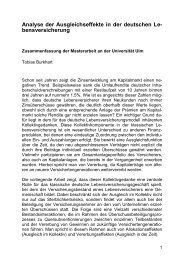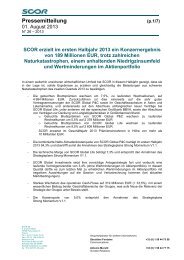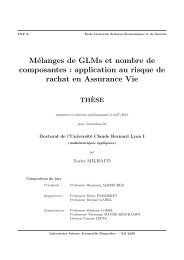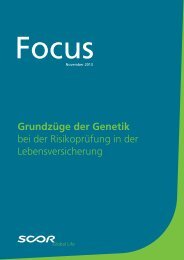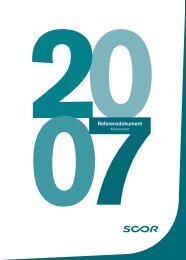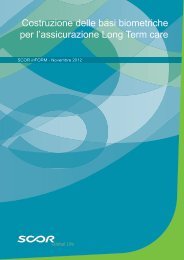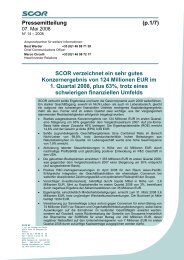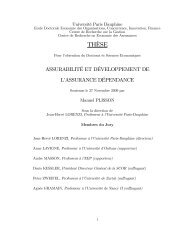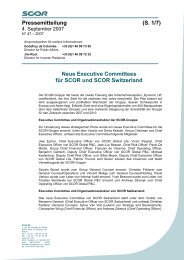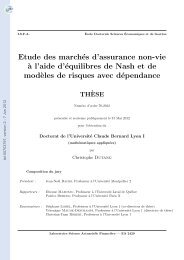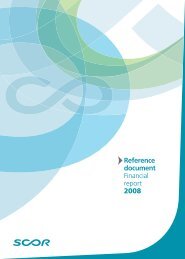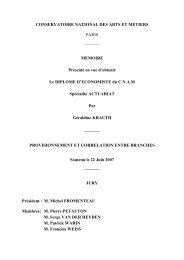4.4 Legal risk - Scor
4.4 Legal risk - Scor
4.4 Legal risk - Scor
Create successful ePaper yourself
Turn your PDF publications into a flip-book with our unique Google optimized e-Paper software.
4 ENVIRONMENTAL IMPACT OF SCOR’S ACTIVITY<br />
Information required under Article R. 225-105 of the Commercial Code<br />
Environmental policy: framework<br />
SCOR’s environmental policy is guided by the international initiative to which it has subscribed. Signatory of the United-<br />
Nations Global Compact since 2003, and the Kyoto Statement under the aegis of the Geneva Association since 2009,<br />
SCOR has strengthened its commitment in 2012 as a founding signatory of the Principles for Sustainable Insurance, a<br />
global initiative placed under the umbrella of the United Nations Environment Program – Finance Initiative (UNEP-FI)<br />
and announced in the run up to the United Nations conference on sustainable development (RIO+20). These initiatives<br />
form the framework in which SCOR SE (the “Company”) and its main subsidiaries implement the Group’s environmental<br />
policy (“SCOR”).<br />
Although reinsurance is not an industrial activity, SCOR strives to conduct its global operation in accordance with the<br />
environmental principles which are set out by the United-Nations Global Compact with regards to prevention, protection<br />
and precaution. Therefore, the environmental policy aims to reduce the environmental impacts directly linked to SCOR’s<br />
activity and whose main source is derived from office management (energy consumption, water consumption…),<br />
business travel (in particular air travel due to the international nature of it’s activity) and to a lesser extent office<br />
equipment (furniture, Information Technology equipment, paper…).<br />
<strong>Scor</strong>’s environmental policy : general organisation and main areas<br />
The Group’s environmental policy is decentralised at “hub” level (in Europe, Cologne, London, Paris and Zurich, in Asia<br />
Pacific, Singapore and in the Americas, Americas Hub) and monitored at Group level by the GREENSCOR manager<br />
who, besides its responsibility with regards to compliance with environmental information disclosure requirements under<br />
the law on the national commitment in favour of the environment, encourages, coordinates and mandates locally<br />
implemented environmental initiatives.<br />
The GREENSCOR manager, appointed in 2009, relies on and reports to the Group Corporate Social Responsibility<br />
Committee (CSR Committee) where he also acts as the secretary. The CSR Committee is chaired by the Group Chief<br />
Operating Officer and gathers the Hubs’ Chief Executive Officer’s, as well as representatives from several central<br />
functions (compliance, Human Resources, Communication, Risk) and operational functions (SCOR Global P&C, SCOR<br />
Global Life, SCOR Global Investments).<br />
Being mindful of controlling its direct “environmental footprint”, the Group supports any initiatives which tend to minimize<br />
the environmental impacts in the following areas: (1) property offices, (2) energy efficiency with regards to its<br />
information technology system, (3) travel:<br />
(1) For several years now SCOR has been implementing projects in the property offices area (acquisition and site<br />
management) in order to reduce its impacts derived from offices that are occupied by SCOR’s employees:<br />
• With respects to offices acquisition, the site in London which is owned by the Group has been certified<br />
BREEAM (”BRE Environmental Assessment Method”). In Cologne, SCOR’s local teams are hosted since<br />
march 2012 in a building that has been awarded an European environmental label. In Paris, the headquarters,<br />
certified “Haute Qualité Environnementale” (HQE) for the design and the construction phase, hosts now most<br />
of the the parisian teams.<br />
• With regards to facility management, beside the Zurich office whose operations are certified ISO 14001,<br />
Cologne and Paris will strive to implement respectively the following standards: EMAS (“Eco-Management and<br />
Audit Scheme”) and HQE operation. These certifications initially planned in 2012 have been postponed to<br />
2013.<br />
• With regards to its investment property portfolio, SCOR has undertaken a proactive approach to the<br />
environemental certification of its portfolio. The Group owns one of the first positive energy tertiary sector<br />
buildings of its size in France (23,000 m 2 ). Moreover, a far-reaching renovation programme set to be rolled out<br />
over 14 months will be conducted on a Parisian surface area of 11,000 m 2 . This operation will aim to receive<br />
triple certification (HQE, LEED, BREEAM) with high levels of excellence, in addition to the granting of the BBC<br />
Effinergie-Rénovation energy label. Once this renovation programme is completed, the surface area subject to<br />
certifications or labels will represent almost 30% of SCOR’s investment property portfolio in France.<br />
(2) With a view to reduce energy intensity of the information technology system (“GREEN IT”), actions have been taken<br />
in the field of Data management and IT furniture:<br />
• The initiatives and projects conducted such as the virtualisation of the servers and the nearly completed<br />
consolidation of the Data Centres on one single data center with a back-up facility (the “Global Data Centre”)<br />
participate to diminishing the energy intensity derived from data management. The energy efficiency target of<br />
the Global Data Centre is to reach a “Power Usage Effectiveness” (PUE) of 1.5.<br />
413



